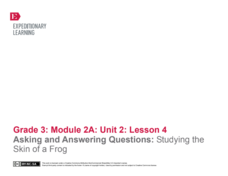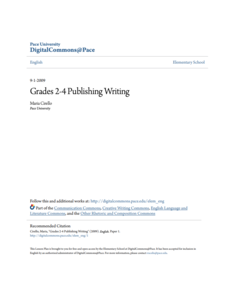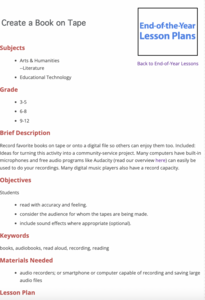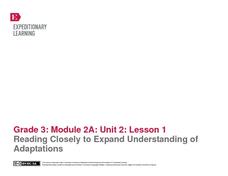Curated OER
You Are What You Read
Sixth graders select a prose, poetry, or nonfiction excerpt from a book of their choice and share it by reading aloud to their classmates, who identify the genre and respond to related questions in their journals.
Curated OER
Poe's Poetry and Prosody
Motivate your class with this lesson plan! Learners use passages from Edgar Allan Poe's poetry to practice reading fluency. They read "The Raven" as a rap song to better understand the rhyming patterns and pauses.
EngageNY
Asking and Answering Questions: Studying the Skin of a Frog
English language arts and science combine in a lesson that focuses on asking and answering questions about frog skin. Discussion, a read-aloud, and partner work lead the way towards a three-page worksheet that tests learners'...
Lakeshorelearning
Read and Write about It
Reading informational text is a skill that transcends subjects and grade levels. Practice reading about different topics in various formats with a language arts lesson that includes opportunities for writing and research as well.
Curated OER
Amos and Boris: Text Study
Twenty insightful questions follow a read aloud of the story, Amos and Boris by William Steig. Scholars then show what they know through completion of a cause and effect chart, reading fluency assessment, and a written explanatory or...
Curated OER
A Colony is Born : Lesson 5 - Dear Mem
Discover colonies! Young historians will listen to a primary source journal entry read aloud with a backdrop of wave sounds. They discuss the entry, add historical facts to a chart and personal insights to another. Then they listen to...
Teaching Oasis
Gingerbread Baby Lesson Plan Guide
Reinforce reading comprehension and story mapping skills with the help from a story, Gingerbread Baby by Jen Brett. Individuals discover new vocabulary, make predictions, retell main events, respond to reading using a graphic organizer,...
ESL Kid Stuff
Christmas Lesson 1
Little ones sing Christmas carols, complete craft projects, and play word games while learning new vocabulary in part one of two-part ESL lesson series.
Curated OER
Reading Meet Writing
Thinking about introducing your middle schoolers to reading log journals? Try the approach suggested by this resource. After reading to the class an article or portion of a novel, demonstrate a Think Aloud and then model how to transform...
Curated OER
Reader's Theater
Conduct a Reader's Theater. Third, fourth, and fifth graders rewrite books with a baseball theme to a Reader's Theater format. They form groups of four or five, practice reading the script, and then perform it for an audience.
Curated OER
Poetry As Oral Performance
Reciting poetry is a great way to build oral language skills and build classroom community. Pupils look at the text elements of poetry and choose a poem to read aloud. They focus on rhythm, fluency, and expression. This is a great way to...
Curated OER
Because of Winn-Dixie
Readers analyze an excerpt from Kate DiCamillo's novel Because of Winn-Dixie. They read silently, and then hear it read aloud. Definitions for underlined vocabulary words are in the margin, and other potentially difficult words are in...
Rainforest Alliance
Knowing the Essential Elements of a Habitat
To gain insight into the many different types of habitats, individuals must first get to know their own. Here, scholars explore their school environment, draw a map, compare and contrast their surroundings to larger ones. They then write...
Museum of Disability
Ian’s Walk and Apples for Cheyenne
Help young learners understand friendship and empathy with two reading comprehension lessons. Each lesson focuses on a story about a child with autism, and encourages readers to compare and contrast the characters to each other and to...
Ontario
Reading Graphic Text
Do students really need to be taught how to read cartoons, comic books, and comic strips? Yes. Just as they need to learn how to read other forms of graphic text such as diagrams, photos, timetables, maps, charts, and tables. Young...
EngageNY
Comparing and Contrasting Two Texts about Poison Dart Frogs: Eggs and Tadpoles
Poison Dart Frog babies are the focus of a lesson that challenges scholars to compare and contrast two informational texts. Beginning with a read-aloud, followed by a discussion, readers complete a practice page that examines the main...
EngageNY
Introducing “If” and Noting Notices and Wonders of the First Stanza
After reading chapter 14 of the story Bud, Not Buddy by Christopher Paul Curtis, scholars take part in a read-aloud of the poem If by Rudyard Kipling and compare it to the reading of Bud, Not Buddy. Learners then go deeper into the poem...
National Woman's History Museum
Susan B. Anthony: She's Worth a Mint!
A instructional activity all about Susan B. Anthony showcases the Civil Rights leader's contributions towards equality. A Susan B. Anthony coin sparks engagement. Scholars take part in a discussion that sheds light on what being an agent...
Pace University
Publishing Writing
Scholars become familiar with tagline literature with the help of the story, Alexander and the Horrible, No Good, Very Bad, Terrible Day by Judith Viort. After a read-aloud and whole-class discussion, leveled groups complete several...
Curated OER
Storytime
By reading two books aloud, Ben and Becky in the Haunted House and The Ghost in the Classroom, youngsters learn new words and understand story events. They workin small groups to review the vocabulary in a game-like setting.
Curated OER
Create a Book on Tape
Learners of all ages record themselves reading their favorite books with accuracy and feeling. They must read with sound effects and consider the audience for whom the tape is being made. They are assessed based on the quality of their...
EngageNY
Reading Closely to Expand Understanding of Adaptations
Third graders work to determine the main idea, recall key details, and answer questions using an informational text on the topic of animal adaptations. Using the non-fiction text "Staying Alive: Animal Adaptations" (provided) the teacher...
Historical Thinking Matters
Rosa Parks: 3 Day Lesson
How can evidence and perspective challenge even the most well-known of stories? Through primary and secondary source analysis, think-alouds, and discussion, young historians evaluate the historical narrative of Rosa Parks across multiple...
Museum of Disability
Zoom!
Turn your class' focus on how wheelchairs assist individuals with disabilities to become more independent with this disabilities lesson plan. Scholars listen to a read aloud of the book, Zoom! by Robert Munsch, answer questions about key...

























